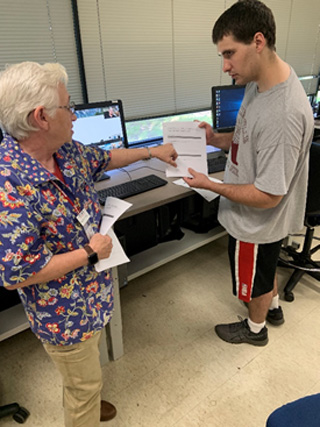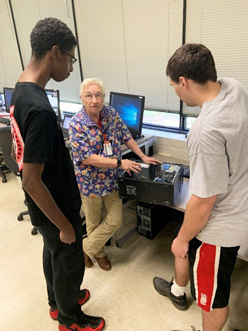A+ Boot Camp prepares students for CompTIA certification

Brenda Phillips, assistant professor of networking,
reviews sample questions on the CompTIA certification
test with Zachary Paulson during the A+ hardware boot
camp.
Zachary Paulson was inspired to enroll at Southwest and major in cyber defense after watching a television show called Mr. Robot.
The series follows a character named Elliott Alderson, a cybersecurity engineer by day and vigilante hacker by night, who has social anxiety disorder and clinical depression. He is recruited by a mysterious insurrectionary anarchist known as Mr. Robot, played by actor Christian Slater, to join a group of “hacktivists.” The group aims to cancel all consumer debt by destroying the data of E Corp, one of the world’s largest corporations. The show has been praised by numerous cybersecurity firms for its technical accuracy. “I’ve always been in to computers since I was a kid,” Paulson said. “My dad worked on them a lot. But when I saw this on TV, within a week it clicked that this is what I wanted to do. The whole hacking and coding and computer stuff in the show is actual code, and everything they are talking about is actual lingo. I watched it and it got me to thinking about a career in cybersecurity and got me to dive in to Southwest.”
As part of his degree training at Southwest, Paulson has to take a course in A+ hardware and software, the starting point for any career in computer information technology. In order to get certified as an entry-level computer technician, students are required to pass the CompTIA test, which demonstrates competency in installing, maintaining, customizing, and operating personal computers. “A+ is basically how a computer works, how the parts interact, and then being able to put them back together again to see how the whole synergy of it interacts,” Paulson said. “In cyber defense, you have to know all of the ins and outs of how computers work, because if you are going to protect something you have to know all of the weak points, just like a bank vault.”

Brenda Phillips explains various computer
components to Davioeous Stewart and
Zachary Paulson.
For the first time this summer, Brenda Phillips, program coordinator of computer information technology and assistant professor in networking offered a new A+ Hardware Boot Camp at the Macon Avenue Campus as a refresher course to help Southwest students prepare for the CompTIA certification tests. The CompTIA test is administered by the Computing Technology Industry Association, a non-profit trade association which issues professional certifications for information technology, and is the preferred credential for technical support and IT jobs.
Phillips provided the extra help on her own time for free, and students could attend free. The boot camp is extremely helpful because the CompTIA test has changed. Phillips reviewed all of the basic material about hardware, as well as new material that is on the test. “The camp is for students who are really serious about receiving the certification,” Phillips said. “It gives them a chance to work with me to see what types of questions might be on the CompTIA and what they need to concentrate on. A lot of the A+ exam is troubleshooting.”
The certification tests in two areas: one area certifies that they are competent hardware technicians and can troubleshoot hardware problems. The second area is the software component and operating systems. “And in between those two things you are tested on hardware – printer support, projectors, peripheral types of ports – that type of thing,” Phillips said. “So I am going back over the concepts that they learned in the classroom.”
Davioueus Stewart, a second-year computer technician student at Southwest, said the Boot Camp helped him get reacquainted with all of the components and troubleshooting methods - things he forgot because he took some time off from college. “I took a year off so I needed a refresher,” Stewart said. “Mostly I needed to catch up on my computer A+ hardware and software. So this has been helpful.”
In This Issue...
- From President Tracy D. Hall
- Welcome aboard, new team members
- EMPLOYEE OF THE MONTH: International Studies Program Coordinator Jessica Miller!
- Financial and Administrative Services implements new time-keeping policy
- CAREER SERVICES CORNER: Southwest co-interns graduate into full-time positions
- International Studies recruiting for committee and Danish Exchange Program
- Ambassadors spread Southwest message to church group seeking job help
- Medical District launches new Mud Island shuttle for students and medical professionals
- Parking decal application goes electronic
- CULINARY CORNER WITH CHEF STEVEN LEAKE
- Hall tells faculty it’s time to go ‘From What to Why’ at Fall Convocation
- New Student Orientation draws over 1,300 high school grads to campus
- A+ Boot Camp readying students for CompTIA certification
- Tennessee Achieves summer institute continues to grow at Whitehaven
- Eureka program shows young girls the benefit of careers in STEM
- Youth explore EMT careers at Shelby County firefighter and emergency services summer rally
- LaunchCode Class Graduates 38 Coders
- SBA Regional Administrator emboldens minority entrepreneurs at federal contract summit
- Memphis hosts sixth annual Save a Life Walk Sept. 14
- Love should not hurt: The Fourth Annual Domestic Violence Summit
- Southwest officially opens new Somerville location
- President’s inaugural Leadership Retreat addresses social mobility and equity
- STAFF KUDOS: Dr. Jacqueline Taylor selected for inaugural THEC Leadership and Innovation Fellows program
- MPLOY summer interns learn job skills and the ins and out of higher education
- STAFF KUDOS: Dean of Faculty Support Jeremy Burnett appointed to Lakeland School Board
- Welcome Aboard: Roger Ogden, Director of Athletics
- SALUQI CORNER
- Southwest: In the News
- Important Dates